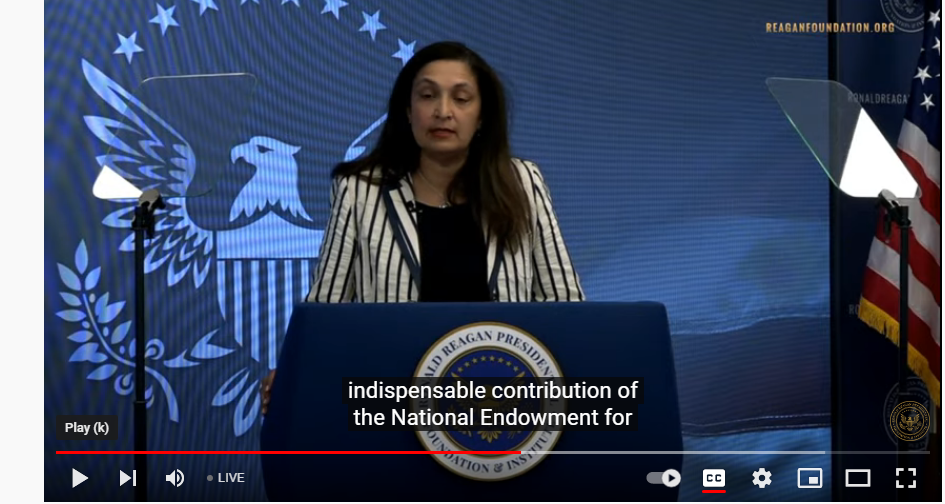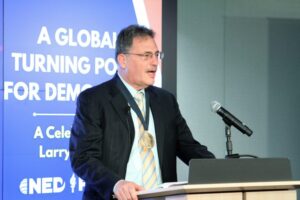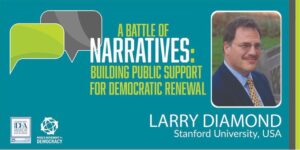Who knew at the time of Ronald Reagan’s Westminster Address that communism would follow leg-warmers and New Coke into the dustbin of history? Under Secretary of State Uzra Zeya told the Reagan Institute today (above). We could not counter authoritarianism without the “indispensable contribution” of the National Endowment for Democracy (NED) family which remains “at the forefront” of defending and advancing that legacy, she added.

The 40th anniversary of the speech should remind us to lift our sights, write CSIS analysts Daniel Runde and Elizabeth Hoffman. Reagan knew, just as human rights activist Natan Sharansky tells us, that dictatorships are brittle, unstable and afraid of their own people. We do not know the day nor the hour when freedom may break out.
To realize this vision, we must continue to invest in the people and institutions working with civil society and democratic activists, they add, and the Reagan Institute’s Westminster 2.0 Working Group will be a good jumping-off point.
 There is still an opportunity to pull the world out of its democratic slump. What is most needed is democratic conviction and resolve, Larry Diamond argues in “Breaking Out of the Democratic Slump.”
There is still an opportunity to pull the world out of its democratic slump. What is most needed is democratic conviction and resolve, Larry Diamond argues in “Breaking Out of the Democratic Slump.”
His January 2020 article is one of ten landmark essays for the Journal of Democracy, including Democracy’s Arc: From Resurgent to Imperiled,” published on the eve of the war in Ukraine, now freely available for a limited time:
- “Three Paradoxes of Democracy,” Summer 1990 — While democracy is the most admired form of government, maintaining it requires contending with its contradictions
- “Rethinking Civil Society: Toward Democratic Consolidation,” July 1994 — What makes civil society best able to help democracy emerge and endure?
- “Is the Third Wave Over?,” July 1996 — Democracy’s global advance is facing headwinds, but there are still opportunities for progress in pseudo-democratic and authoritarian states.
 “Elections Without Democracy: Thinking About Hybrid Regimes,” April 2002 — Many countries have adopted the semblance of democracy with little of its substance. The task of classifying regimes is now more difficult—and more essential.
“Elections Without Democracy: Thinking About Hybrid Regimes,” April 2002 — Many countries have adopted the semblance of democracy with little of its substance. The task of classifying regimes is now more difficult—and more essential.- “The Quality of Democracy: An Overview” (with Leonardo Morlino), October 2004 — What makes democracy “good” or “better,” and how can we both measure and encourage progress?
- “Liberation Technology,” July 2010 — The latest communications innovations enable citizens to express opinions, mobilize protests, and expand freedom. But autocrats are learning to master these technologies, too. Whether democracy prevails will depend not just on technology, but on organization and strategy.
- “The Impact of the Economic Crisis: Why Democracies Survive,” January 2011 — The world’s emerging democracies are weathering the global economic crisis. Yet an even sharper threat remains: their failures to deliver good governance.
- “Facing Up to the Democratic Recession,” January 2015 — Democracy has been in a long-term global recession. Committed and resourceful engagement by established democracies is necessary to reverse the trend.
- “The Road to Digital Unfreedom: The Threat of Postmodern Totalitarianism,” January 2019 — Democrats worldwide are in a race against time to prevent cyberspace from becoming an arena for surveillance, control, and manipulation.







